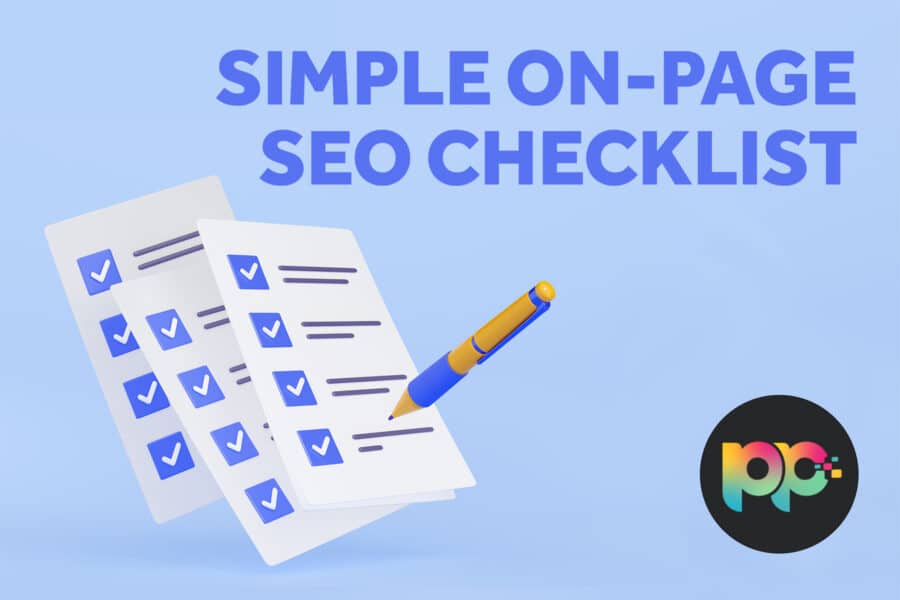Simple On-Page SEO Checklist for 2025
8th February 2025

When it comes to ranking higher on Google, you can throw all the clever ads and paid campaigns in the world at your site but if your on-page SEO isn’t up to scratch, you’re fighting an uphill battle. Having a proper On-Page SEO Checklist to follow is essential, whether you’re giving your existing pages a spruce-up or launching something brand new. Priority Pixels work with clients every day to make sure their websites aren’t just beautiful but built on solid SEO foundations.
Let’s get into it and take a proper look at the basics you need to tick off to make sure your site is search-engine friendly in 2025.
1. Page Titles That Actually Mean Something
Your page titles are the first thing both users and search engines see. They need to be clear, descriptive and include your focus keyword naturally. Avoid the temptation to stuff in every keyword you can think of. It won’t impress Google and it definitely won’t impress your visitors. Instead, write titles that make sense to real people while giving search engines a strong hint about the page’s content.
Top tip: Keep titles under 60 characters so they don’t get awkwardly chopped off in search results.
2. Meta Descriptions That Are Worth Clicking
Meta descriptions don’t directly affect rankings but they have a huge impact on click-through rates. A good meta description is like a handshake before the conversation – it sets the tone. Aim for around 155 characters, use active language and include your main keyword if it fits naturally. Remember, you’re trying to invite a click, not recite a list of search terms.
3. Sensible URL Structures
Clean, readable URLs are much easier for both users and search engines to understand. Use short, descriptive slugs with keywords where appropriate. For instance, www.yourwebsite.co.uk/on-page-seo-checklist is far better than www.yourwebsite.co.uk/page?id=1234. Avoid unnecessary words, numbers or confusing jargon. No one’s got time for that.
4. Headers That Guide, Not Confuse
Headers (H1s, H2s, H3s and so on) help break your content into manageable sections. Think of them like chapter titles in a book. Your page should have one H1 (usually the title) and then subheadings to make scanning easy for busy visitors. Sprinkle keywords naturally into headers where it makes sense but don’t force it. Google’s clever enough to tell when you’re trying too hard.
5. Images With Purpose (and Proper Alt Text)
Images make your pages more engaging but they can also be a goldmine for SEO if used properly. Always add descriptive alt text that explains what the image is about. It’s good for SEO and brilliant for accessibility too. Nobody benefits from ‘image1234.jpg’ being the alternative text, so don’t be that person.
While you’re at it, make sure your images are optimised for fast loading. There’s no point having a gorgeous full-page hero image if it takes three minutes to appear.
6. Internal Linking That Makes Sense
Internal links guide visitors deeper into your site and help spread authority across different pages. Link naturally where it benefits the reader – if you’ve written a cracking blog about technical SEO, link to it when you mention it. Think of internal links as friendly nudges rather than desperate pleas for attention.
Priority Pixels always advises clients to plan internal linking as part of their content strategy, not as an afterthought.
7. Mobile First (Because It’s 2025)
It’s been a few years since Google switched to mobile-first indexing and yet some websites still seem shocked by it. Your pages need to look and work flawlessly on phones and tablets. Text needs to be readable without pinching and zooming, buttons need to be thumb-friendly and loading times need to be quick.
Priority Pixels builds every bespoke WordPress site with mobile users in mind from the very start because let’s be honest, who’s only browsing on desktop these days?
8. Speed Matters (Impatient Visitors Are Real)
If your page takes longer than three seconds to load, don’t be surprised if people abandon ship. Site speed affects both user experience and rankings. Compress images, use lazy loading, minimise unnecessary scripts and make sure your hosting isn’t letting you down. Think of it like tidying your house before guests arrive – no one wants to step over clutter just to get to the good stuff.
9. Structured Data: Helping Search Engines Help You
Structured data, also known as schema markup, is one of those SEO techniques that sounds far scarier than it actually is. In simple terms, it’s extra information you add to your pages that helps search engines understand what your content is about.
Adding structured data can make your pages eligible for rich snippets, like review stars, event dates or product information right there in search results. It’s not just about standing out either – rich snippets tend to boost click-through rates because they make your listing more attractive and trustworthy.
Priority Pixels always recommend adding relevant schema where it makes sense, whether that’s for blog articles, products, services or FAQs. It’s one of those small tweaks that can quietly make a big difference over time.
10. Content Is (Still) King
Finally, and this can’t be said enough, quality content is everything. No amount of technical tweaking will save a page that offers nothing useful. Write for people first, search engines second. Provide answers, insights, solutions and a little bit of personality. Your content should reflect your brand’s voice, whether that’s friendly and casual or polished and professional.
Priority Pixels always recommends thinking about what your audience genuinely needs help with, then building your pages around that. It’s the most sustainable SEO tactic out there and it’s far less exhausting than chasing algorithms.
Want help getting your site fighting fit for 2025? The SEO experts at Priority Pixels are ready to roll up their sleeves. Get in touch today and let’s have a proper chat.